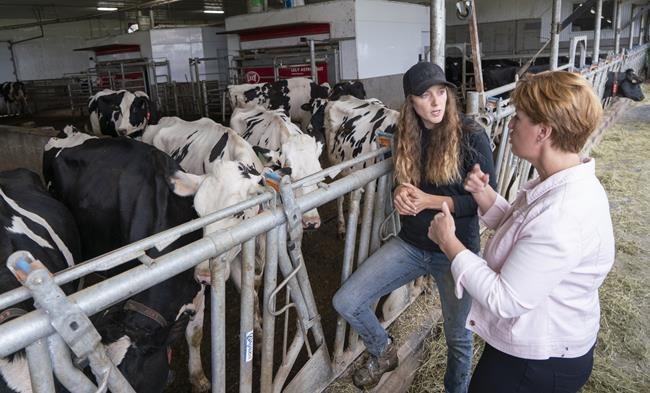WASHINGTON — Dairy industry advocates and trade officials in the United States celebrated a rare win over Canada on Tuesday after a panel of arbitrators agreed that America's northern neighbour is denying U.S. producers their fair share of access to the Canadian market.
The federal government in Ottawa, however, tried to claim the decision as a victory for the Canadian dairy sector, framing it as an endorsement of supply management — the complex and controversial policy framework that regulates the way dairy products are produced and sold in Canada.
U.S. Trade Representative Katherine Tai formally requested a dispute settlement panel last May to examine allegations from American producers that the way Ottawa allocates its import quotas for stateside dairy products is a violation of the U.S.-Mexico-Canada Agreement.
On Tuesday, that panel largely sided with the USTR, giving Canada until Feb. 3 to either respond or comply with the decision.
"This historic win will help eliminate unjustified trade restrictions on American dairy products," Tai said in a full-throated statement shortly after the decision was released.
Tai noted it will ultimately "ensure that the U.S. dairy industry and its workers get the full benefit of the USMCA to market and sell U.S. products to Canadian consumers."
At the heart of the dispute is how Canada has distributed its tariff-rate quotas, or TRQs — the quantities of certain dairy products like milks, cheeses, powders, yogurt and even ice cream — that can be imported at lower duty levels under the terms of the USMCA, which Ottawa prefers to call CUSMA.
U.S. trade officials and dairy industry advocates say a large share of those quotas have been allocated to processors rather than producers, effectively denying U.S. farmers their fair share of the Canadian market.
"The current Canadian system, which sets aside significant TRQ volumes only for processors, does not pass muster under the treaty," the panel concluded.
The report continues to say that "nothing in the panel's ruling constrains Canada's discretion to administer its TRQ however it wants, within the treaty’s set limits. Quite the contrary — Canada has significant discretion in designing and implementing its allocation mechanisms."
That appeared to be the basis for a statement from Trade Minister Mary Ng and Agriculture Minister Marie-Claude Bibeau that called the ruling "overwhelmingly in favour of Canada and its dairy industry," because it "expressly recognizes" Canada's right to regulate its dairy market.
But the U.S. complaint was never about challenging the Canadian system in the first place, the decision pointed out.
"In its written submissions, the United States expressly states 'that it is not challenging Canada's right to maintain its supply management system,'" it noted. "It is the inflexible pool system Canada has designed here that is objectionable, not Canada's general ability to allocate its TRQs in the manner it desires."
By day's end, the federal government appeared to be abandoning its triumphant pose, pointing not to the latest ruling but to the long history of Canada-U.S. disputes over dairy exports that predates the latest version of the North American trade agreement.
"Three out of the four rulings were in Canada's favour, and we are reviewing the one finding against Canada," said Alice Hansen, Ng's press secretary.
"Specifically, the panel affirmed that Canada retains discretion to allocate quotas to processors. Canada can and will continue to allocate TRQs to dairy processors. We will keep working closely with the dairy industry to develop this new mechanism, and we will continue to have their backs."
The USTR has long insisted Canada's practices with regards to TRQs are expressly forbidden under the text of the agreement. Canadian officials say the allocations are perfectly in keeping with the rules of the trade agreement, which took effect in July 2020.
"The United States and Canada negotiated specific market access terms covering a wide variety of dairy products, but instead of playing by those mutually agreed upon rules, Canada ignored its commitments," said Jim Mulhern, president and CEO of the D.C.-based National Milk Producers Federation.
"Today's decision is an important victory for U.S. dairy farmers and the millions of Americans whose jobs are tied to the U.S. dairy industry."
A brief statement from the Dairy Farmers of Canada, meanwhile, echoed Ottawa's position on Canada's right to establish its own policy for allocating tariff-rate quotas.
"Now it is for the Canadian government to assign TRQs and demonstrate its support for its domestic dairy sector."
This report by The Canadian Press was first published Jan. 4, 2022.
James McCarten, The Canadian Press



